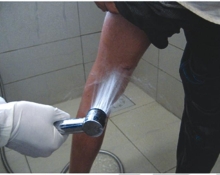 Wound cleansing and immunization within a few hours after contact with a suspect rabid animal can prevent the onset of rabies and death. Rabies is a zoonotic disease (a disease that is transmitted to humans from animals) that is caused by a virus.
Wound cleansing and immunization within a few hours after contact with a suspect rabid animal can prevent the onset of rabies and death. Rabies is a zoonotic disease (a disease that is transmitted to humans from animals) that is caused by a virus.
The disease infects domestic and wild animals, and is spread to people through close contact with infected saliva via bites or scratches. Dogs are the source of 99% of human rabies deaths.
Rabies is a neglected disease in Pakistan, although the incidence of dog bites in the country is very high.
In 2010, more than 97 000 recorded cases of dog bites were reported by basic health units alone. Those managed by secondary and tertiary care facilities, private practitioners and spiritual healers and hakims are not recorded.
Research has revealed that most of the population are either unaware of the risk of rabies when bitten by rabid dogs, or do not seek the right treatment for its prevention.
Other weaknesses in the control of rabies in Pakistan include:
lack of a surveillance system
limited access to up-to-date rabies vaccines and immunoglobulin
inadequate resources and political support
weak collaboration between different government departments and sectors including the health authorities, livestock and veterinary science authorities and local government.
WHO response to rabies in Pakistan
WHO, in collaboration with provincial health authorities, is working to develop dog bite treatment centres to strengthen post-exposure prophylaxis. Plans are being developed to involve other sectors, such as livestock authorities and veterinary research centres, in rabies control.
The main features of WHO's strategy for rabies control are:
mass awareness on rabies transmission, prevention and self-protection using cost-effective methods such as local government and community communication structures
establishment of rabies treatment centres at each district headquarters hospital where health-care providers will be trained on management and treatment of dog bites with anti-rabies vaccine
ensuring the most cost-effective and efficacious anti-rabies vaccines in designated rabies treatment centres in all districts
enactment and enforcement of laws relating to vaccination of pet animals, such as dogs and cats, in order to decrease rabies incidence among them
creation of a mechanism to decrease the stray dog population in districts through the use of modern methods such as bait vaccination and dog elimination.
development of a surveillance system to monitor dog bites, dog rabies and human rabies through the use of the existing death reporting system under local government structures
close collaboration between the three government departments involved in the control of rabies
research on animal rabies and the development of animal and human rabies vaccines by the University of Veterinary Sciences in Lahore.
WHO will support all relevant authorities, and in particular the Punjab Department of Health, in achieving the above interventions over the next two years.
Regional programme on tropical diseases and zoonoses
Regional programme on vaccine-preventable diseases and immunization


